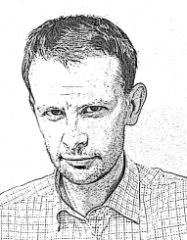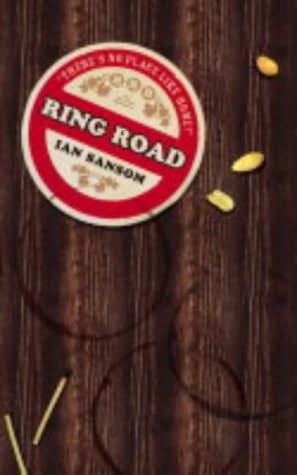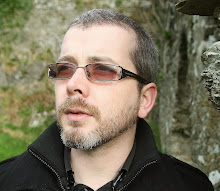
I think I’m under the CSNI influence. I’m predominantly a science fiction/fantasy man, so will somebody explain why I recently came home from a shopping trip with Lucy Caldwell’s Where They Were Missed, Adrian McKinty’s Dead I Well May Be and The Dead Yard (I won the third book, The Bloomsday Dead, in a CSNI competition), and two Ian Sansom books, The Case of the Missing Books and Ring Road.
There seems little point reviewing these books as the CSNI blogmeister has already done just that. Consider the following a second opinion.
First of all I read Lucy Caldwell’s book. I was a tad confused at first by the setting. What era was I in? The cover places it in the late sixties/early seventies, whereas the narrative suggested a later date. And so it was. The moral is: pay no heed to covers, they be the work of someone who hasn’t read the book!
setting. What era was I in? The cover places it in the late sixties/early seventies, whereas the narrative suggested a later date. And so it was. The moral is: pay no heed to covers, they be the work of someone who hasn’t read the book!
This is the story of two young sisters growing up in the mid-eighties. scarcely comprehending the social chaos around them, whether it’s the Troubles, their Catholic mother’s depressions or their Protestant daddy leaving home. It’s told from the POV of the seven-year-old Saoirse and the innocent voice never falters: an adult perspective is not allowed to intrude on the child’s world. I was massively impressed when I turned a page and thought, oh, she’s grown up. Lucy Caldwell had advanced the timeline nearly ten years and I knew it straight away, just from the central character’s voice.
This is a quiet book, and there’s a melancholy undercurrent, but it manages to avoid being depressing. I actually found it uplifting without being sappy or mawkish, thanks mainly to Saoirse being strong and feisty. She makes mistakes, but learns from them and grows. At the end I closed the book and wished her well for the future. It’s that kind of read.
I could easily argue that Where They Were Missed isn’t a crime novel and doesn’t really merit a place on CSNI, but that would be silly. Who gives a fig about genres when a book is this good. I loved it. Four stars out of five.
 For contrast, I then picked up Adrian McKinty’s Dead I Well May Be. I knew from the reviews I’ve read on these webpages that there was going to be violence, bloodletting and, most importantly, top quality writing. What can I say that hasn’t already been said?
For contrast, I then picked up Adrian McKinty’s Dead I Well May Be. I knew from the reviews I’ve read on these webpages that there was going to be violence, bloodletting and, most importantly, top quality writing. What can I say that hasn’t already been said?
The main character, Michael Forsythe, is a complex bloke. He genuinely looks for the good in people . . . but that doesn’t stop him from putting a bullet in a guy’s elbows, knees and ankles – a Belfast sixpack – in the first chapter. Well, Forsythe reasons, if he hadn’t done it, someone else would’ve, and likely made a hash of it too. Better for the victim that he does it. See? The guy’s all heart really. OK, I’m making a joke of it it, but really, Adrian McKinty does a bang-up job of presenting us with a central character who is incredibly resilient and at times ruthless, but allows us to see him experiencing pant-wetting fear, self-doubt and suicidal despair. Forsythe’s a bastard, but he has his reasons and you can’t help but admire him. From a distance.
I haven’t even waxed lyrical about the Adrian McKinty’s prose yet, which borders on the poetic, or how effectively he uses fragments, something I’ve hitherto not cared for. Nor have I said how bloody good he is at creating a sense of place, or how cleverly he uses foreshadowing to keep you reading one more chapter before you put the book down. I’m not going to prattle on about these things because this isn’t meant to be a review, just a quick appraisal. Dead I Well May Be is an awesome book, the best I’ve read in a long time. Some folks are telling me the second book is even better. That takes some doing. No hesitation, five stars.
I wanted to read the first of Ian Sansom’s Mobile Library books next, but my dad borrowed my copy without returning it so I started Ring Road instead. It’s not crime, but it’d be criminal to overlook it! (Ha bloody ha.)
copy without returning it so I started Ring Road instead. It’s not crime, but it’d be criminal to overlook it! (Ha bloody ha.)
How can I describe this book without making it sound as dull as ditch water? God knows how Ian Sansom pitched it to his agent. It’s about a small Irish town that has declined over the years, the decline symbolised by a busy ring road and a shopping mall. There is no central character, in the same way a TV soap doesn’t have a central character. Everyone’s life counts. And they have small town lives. Nothing exciting ever happens in this town, unless you consider a mayor on the make exciting, or a newspaper editor sacking the writer of the bat-watch column, or care about Mr Donnelly’s dog getting arthritis.
So how does Sansom make it all come to life? Well, I think this passage from the final chapter gives you a fair idea:
There seems little point reviewing these books as the CSNI blogmeister has already done just that. Consider the following a second opinion.
First of all I read Lucy Caldwell’s book. I was a tad confused at first by the
 setting. What era was I in? The cover places it in the late sixties/early seventies, whereas the narrative suggested a later date. And so it was. The moral is: pay no heed to covers, they be the work of someone who hasn’t read the book!
setting. What era was I in? The cover places it in the late sixties/early seventies, whereas the narrative suggested a later date. And so it was. The moral is: pay no heed to covers, they be the work of someone who hasn’t read the book!This is the story of two young sisters growing up in the mid-eighties. scarcely comprehending the social chaos around them, whether it’s the Troubles, their Catholic mother’s depressions or their Protestant daddy leaving home. It’s told from the POV of the seven-year-old Saoirse and the innocent voice never falters: an adult perspective is not allowed to intrude on the child’s world. I was massively impressed when I turned a page and thought, oh, she’s grown up. Lucy Caldwell had advanced the timeline nearly ten years and I knew it straight away, just from the central character’s voice.
This is a quiet book, and there’s a melancholy undercurrent, but it manages to avoid being depressing. I actually found it uplifting without being sappy or mawkish, thanks mainly to Saoirse being strong and feisty. She makes mistakes, but learns from them and grows. At the end I closed the book and wished her well for the future. It’s that kind of read.
I could easily argue that Where They Were Missed isn’t a crime novel and doesn’t really merit a place on CSNI, but that would be silly. Who gives a fig about genres when a book is this good. I loved it. Four stars out of five.
The main character, Michael Forsythe, is a complex bloke. He genuinely looks for the good in people . . . but that doesn’t stop him from putting a bullet in a guy’s elbows, knees and ankles – a Belfast sixpack – in the first chapter. Well, Forsythe reasons, if he hadn’t done it, someone else would’ve, and likely made a hash of it too. Better for the victim that he does it. See? The guy’s all heart really. OK, I’m making a joke of it it, but really, Adrian McKinty does a bang-up job of presenting us with a central character who is incredibly resilient and at times ruthless, but allows us to see him experiencing pant-wetting fear, self-doubt and suicidal despair. Forsythe’s a bastard, but he has his reasons and you can’t help but admire him. From a distance.
I haven’t even waxed lyrical about the Adrian McKinty’s prose yet, which borders on the poetic, or how effectively he uses fragments, something I’ve hitherto not cared for. Nor have I said how bloody good he is at creating a sense of place, or how cleverly he uses foreshadowing to keep you reading one more chapter before you put the book down. I’m not going to prattle on about these things because this isn’t meant to be a review, just a quick appraisal. Dead I Well May Be is an awesome book, the best I’ve read in a long time. Some folks are telling me the second book is even better. That takes some doing. No hesitation, five stars.
I wanted to read the first of Ian Sansom’s Mobile Library books next, but my dad borrowed my
 copy without returning it so I started Ring Road instead. It’s not crime, but it’d be criminal to overlook it! (Ha bloody ha.)
copy without returning it so I started Ring Road instead. It’s not crime, but it’d be criminal to overlook it! (Ha bloody ha.)How can I describe this book without making it sound as dull as ditch water? God knows how Ian Sansom pitched it to his agent. It’s about a small Irish town that has declined over the years, the decline symbolised by a busy ring road and a shopping mall. There is no central character, in the same way a TV soap doesn’t have a central character. Everyone’s life counts. And they have small town lives. Nothing exciting ever happens in this town, unless you consider a mayor on the make exciting, or a newspaper editor sacking the writer of the bat-watch column, or care about Mr Donnelly’s dog getting arthritis.
So how does Sansom make it all come to life? Well, I think this passage from the final chapter gives you a fair idea:
Strange, how even here in our town, a place where we all went to the same schools, wear the same kind of clothes, pretty much, give or take the occasional item of eccentric holiday headgear or party high heels, and where we watch the same television programmes, and eat the same kind of food at the same kind of time, and read the same papers, even here it’s possible for two people occupying the same space and time and the same brand of jeans and trainers to misunderstand each other completely and utterly. It does not bode well for the future of humankind – if we can’t read each other right around here, then where?In the simplest language possible, and with the longest sentences possible, the author makes these insightful observations throughout Ring Road. It’s a warm and funny book, respectful to its subject and, dare I say it, slightly eccentric. Footnotes can go on for over a page. The acknowledgements run for three pages and throws up names like Stevie Wonder, Jim Carrey, the Specials, George Clooney. Ring Road is the only novel I’ve read that features an index.
So yes, definitely eccentric, but also a work of genius, I think. A five star book I will read again.




8 comments:
Mike,
Thanks for the kind words. I'm a convert from sci fi too and I still read JG Ballard (long may he live!) and Iain Banks's Culture novels.
Cheers mate
a...
Adrian, you're welcome.
I've got all of Iain Banks' books -- with or without the middle M -- and though it saddens me to say it, I think his best may be behind him.
I've only read The Wasp factory, but, boy, that was a cracker! I have Espedair Street on the bookshelf, but I've no idea of when I'm going to get to it. I keep picking up the crime fiction books before all the other genre stuff I read for the sake of CSNI.
Not that I'm complaining. It all rocks.
gb
Gerard, you will love Espedair Street when you get round to reading it. And if you get the chance, read The Bridge as well. It's stunning.
McKinty secretly believes that crime is for grownups and sci fi is for kids,that's why he only uses it in his YA novels.
After his dismissal of the sff genre on Crime Always Pays I've tried to give him some new names,but it is hard to re-convert a lapsed faithful.
Re:Banks
How can you not love someone who begins a book with
"It was the day when my grandmother exploded"
Though my favourite is probably The Bridge.
Ciao,
Marco
Marco
Hehehe, thanks for the comment, Marco.
Though in fairness to Adrian, I think he said he'd outgrown the sword and sorcery fantasy genre. At his last signing in No Alibis, he said he'd love to be able to write convincing science fiction for adults, but felt he wasn't well-versed enough to tackle the science side of the genre.
Mike - Recommendation duly noted. And Marco has seconded it. I'll just have to make time.
gb
Marco
No, I think Ballard, PKD and Banks write adult books and I've written down your suggestions for my TBR pile. Its fantasy. I dont mind sci fi. Is there a more grown up sci fi writer than Ursula Le Guin? But her fantasy books dont move me at all. In fact I just cant get with the whole Robert Jordan, Terry Brooks, Terry Pratchett thing at all. I dont know, that stuff just puzzles me and leaves me uninvolved.
Harry Potter's another excellent example of where I'm in the wrong. Wildly popular everywhere, praised by critics and the public alike and yet I cant get into those books at all. Too many adverbs? The Dickensian names? The twee-ness? I dont know. I know I should like Potter but I dont. I find the prose style claustrophobic and the central conceit chilly and unengaging.
cheers mate
a..
My post wasn't too serious,Adrian.
I knew that there were sci-fi writers you did respect,like PKD,but I only discovered trough the contest on your blog that you do also write Sf for YA and found it funny,in light of previous discussions.
Re:fantasy
I more or less agree,though I like Pullman and (more for the satire than the setting) Pratchett.
However the Tolkien/Dungeons and Dragons style of fantasy,wildly successful as it is,is not the only one.
There's also the kind more interested with the bleeding of the strange and unexplained into the ordinary,along the lines of Hoffmann's Der Sandmann,Shirley Jackson, Borges, Kafka or Calvino,than with the meticulous mapping of made-up worlds.
Among the writers I mentioned on earlier posts,Jeffrey Ford and Kelly Link write this kind of fantasy,and produced two of my favourite short stories ever,respectively "The Empire of Ice-Cream" and "Magic for Beginners".
Cheers,
Marco
Post a Comment